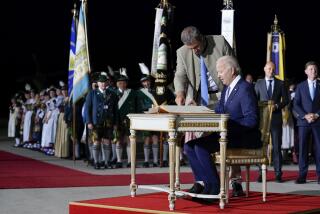Gorbachev Has Shopping List for Capitalists
- Share via
Capitalists coming to tea. Top executives of 80 U.S. companies will meet with Soviet leader Mikhail S. Gorbachev next Thursday afternoon at the Soviet embassy in Washington. They will be there to size up business prospects in the Soviet Union.
Gorbachev for his part will be eager to attract the U.S. companies into joint ventures with Soviet ministries and state production organizations. The American firms, he will say, could own 49% of the joint venture company, with the Russian organization owning 51%, and the Americans could earn profits in dollars--not in rubles.
Why is the general secretary of the Communist Party of the Soviet Union talking about profits and ownership? Because he wants the U.S. companies’ help in shaping up a woefully inefficient economy.
The Soviet Union is big--284 million people, a $2-trillion gross national product that is slightly larger than Japan’s. But it is poor--GNP per person of $7,400 is less than half that of Japan or the United States, and the Soviet civilian standard of living is even lower than the statistics indicate.
Gorbachev tacitly admitted how bad things are last week, in an interview on NBC, when he opposed open emigration policies because they would produce a Soviet “brain drain”--if the gates were opened, that is, the smart people would leave.
Give him his due, Gorbachev wants to change that--and his shopping list is long. Specifically, he wants foreign help to upgrade efficiency in the food and agriculture industries, and in energy, chemicals, petrochemicals and pharmaceuticals.
He wants help with consumer goods and housing construction; with transportation and communications and factory automation--with practically everything.
The executives he’s invited to the embassy are a cross-section of U.S. industry: Dwayne Andreas of soybean processor Archer Daniels Midland, Richard Mahoney of Monsanto in chemicals, Wayne Calloway of Pepsico--which is opening two Pizza Huts in Moscow--John Murphy of Dresser Industries, Fred O’Green of Litton Industries.
The chairman of Seagram’s and the president of Coca-Cola are invited. Chairman Charles Hugel of Combustion Engineering, which just entered a Soviet joint venture, will be there along with Chairman Armand Hammer of Occidental Petroleum, who built a pencil factory for Lenin in the early days of the Soviet Union.
Most of the companies have been there before. In the early 1970s when detente, not glasnost, was the word, there was talk of joint ventures, too. But things never got very far and Soviet refusals to allow emigration, plus the invasion of Afghanistan chilled business prospects. U.S.-Soviet trade at less than $2 billion, including grain sales, is a relative pittance.
Profits in Fuel
Will things go better with Gorbachev? Combustion Engineering will soon find out. The Stamford, Conn., company agreed last month with the ministry of oil refining and petrochemical industries to form a $16-million joint venture that will use CE’s process control instruments and software to increase the output of oil refineries and petrochemical plants.
The venture works on incentive. As its technology increases the refineries’ output of gasoline and fuel oil, the venture will be paid a percentage of that increase. Combustion then can take its share of the profit--not in dollars but in gasoline and fuel oil, which it can sell on world markets to get the dollars. It is protected from oil price fluctuations by a guaranteed return on investment--probably not less than 15% after tax.
The Soviets hope the venture will grow to the equivalent of $200 million in sales (a lot of refineries need help), and Combustion’s Hugel hopes this deal leads to others in a huge, growing market.
All the executives at Thursday’s meeting will be thinking of that market, too--and wondering if Gorbachev can deliver it.
The executives understand corporate infighting; know there’s no certainty that Gorbachev can stay in power, much less change a slothful economy. But if he can deliver more than good caviar and polite conversation, the payoff for American business and the Soviet Union could be significant.
More to Read
Inside the business of entertainment
The Wide Shot brings you news, analysis and insights on everything from streaming wars to production — and what it all means for the future.
You may occasionally receive promotional content from the Los Angeles Times.










